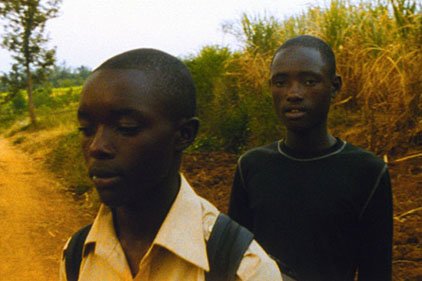LITTLE ROCK — Unless you live in Northwest Arkansas, Lee Isaac Chung's preternaturally sensitive Munyurangabo is not playing in a theater near you. It may well be that the only in-state screening of this special film will be Saturday, at 7 p.m. at Lincoln High School in the town of the same name about 20 miles southwest of Fayetteville. But I'm going to tell you about it anyway.
The only reason Munyurangabo, which is distributed by and available on DVD through the subscription service Film Movement (filmmovement.com) is being shown at all in Arkansas is because its director, Lee Isaac Chung, went to high school in Lincoln. He shot this movie in Rwanda, while he was there teaching a filmmaking class to 15 refugees and orphans of the 1994 genocide.
One of his old teachers, Ed Marshall, thought a hometown screening might be a good way to recognize Chung's achievement and raise some money for the school's Beta Club. (Marshall takes a group from the club to Europe every summer.)
If you think you want to go Saturday, it might be good for you to call him at (479) 841-1487 to make sure they can accommodate you. They probably can, if the first screening fills up, they're planning on running the film again around 9 p.m.
But the reason Munyurangabo is getting a review in the statewide newspaper isn't because it's a movie made by a director with Arkansas connections (although that's often enough to merit some notice) but because it's a remarkable movie that a lot of people might want to see regardless of its provenance. It's an encouraging work on a number of levels, not least because it reveals a young filmmaker with a rare gift for storytelling and a compassionate spirit.
Most remarkably of all, considering the film springs from an academic exercise, is its absolute freedom from didacticism and condescension. Munyurangabo is so empathetic to its subject - the still-wounded Rwanda - that it's difficult to think of a Western film that serves as a valid reference point. Compared to Munyurangabo, admirable films like Terry George's Hotel Rwanda or Michael Caton-Jones' Shooting Dogs seem like so much heavy-handed melodrama.
It's much more like the movies of the late Senegalese poet Ousame Sembene (Moolaade) or certain visual poems from Burkina Faso. Maybe Chung saw some of those in film school. Maybe he just listens well.
It is the story of two young friends Munyurangabo (Jeff Rutagengwa) andSangwa (Eric Ndorunkundiye), who make their way from the Rwandan capital of Kigali to the rural hut where Sangwa's family ekes out a living. It's giving nothing away to say they are on a mission to murder the man who killed Munyurangabo's father - their intentions are telegraphed in the opening scene, when 'Ngabo (as he's called) steals a machete from a distracted street vendor.
Sangwa's family harbors mixed feelings about Sangwa's return. They are happy to see their son, but still confused and angered by his leaving three years earlier. And now that'she's home they have to feed him - and what about the stranger he was brought with him? Sangwa's father in particular doesn't like him: He's lazy, he drinks, he's other - a Tutsi in a predominantly Hutu region.
Munyurangabo isn't a perfect movie - some scenes go on a little long, and moviegoers unused to the oblique and sometimes discursive rhythms of African cinema might sometimes wish for a snappier pace or a more pointed, less allusive, effect. There's no on-screen violence, and Chung allows important bits of information to trickle out (like the precious water from the communal well that plays an important role in the story). Though issues of tribalism and revenge-taking charge the atmosphere, characters are restrained by an elegant civility that seems born of custom and self-preservation.
It's also a raw, micro-budget affair. Chung employed a nonprofessional cast of actors, most of whom were directly affected by the genocide and whose stories informed the production. It was shot in less than two weeks and most of its dialogue is improvised, although Chung and Samuel Anderson provided a script that served as a blueprint.
Yet despite the sketchy, documentary feel, Chung's camera is disciplined and alert to compositional nuance, alternately framing characters with architectural elements and exposing their isolation in long shots. Sometimes his camera studies the ribs of leaves, drifting momentarily into a sortof Terrence Malickian trance and implying an abiding, glorious jungle waiting to reclaim the blood-soaked land.
Near the end the camera assumes the point of view of a character as it receives a fierce recitation of a nationalistic poem by a shabby-looking man (Edouard B. Uwayo, the poet) loitering outside a meager-looking restaurant. It's a remarkable long take that both challenges and hypnotizes 'Ngabo, as well as the audience. It also effectively demonstrates the enormous musicality of the swooping and stopping Kinyarwanda tongue.
Munyurangabo is the first film ever made in that language, by the way. It's also a beautiful, deep and humane film that resonates with hope.
MovieStyle, Pages 33, 38 on 09/18/2009
